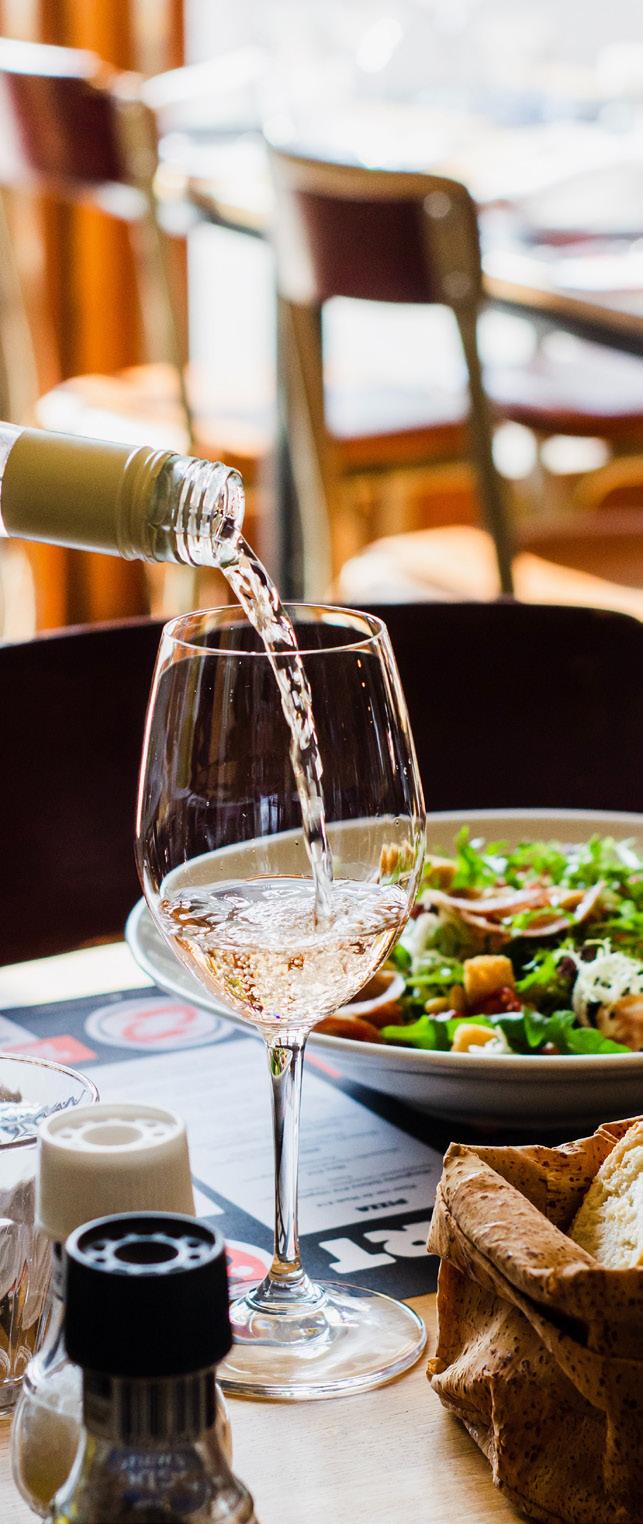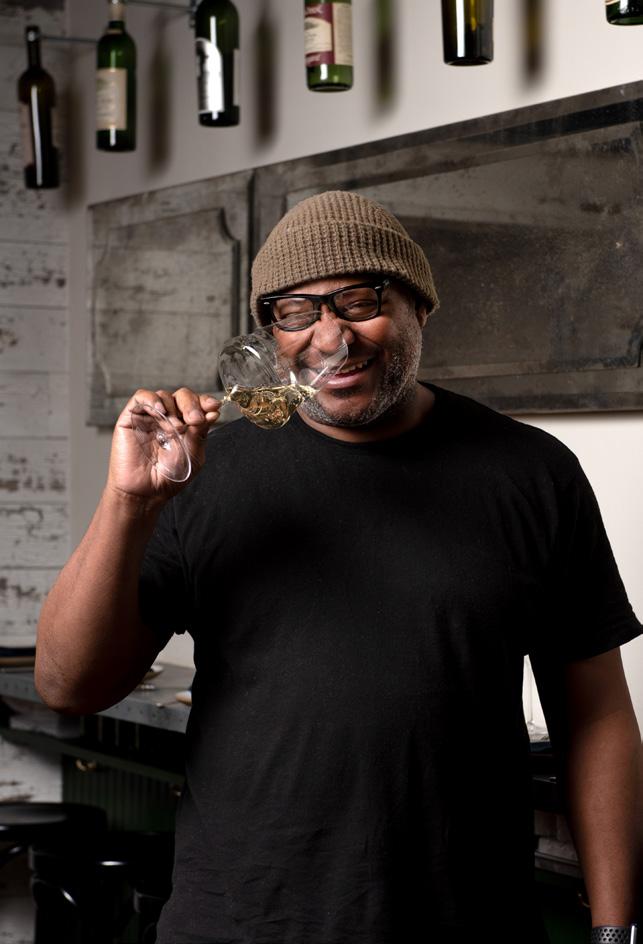
10 minute read
The Rise of Sommeliers as Influencers

With André Mack and Rex Leung
André Mack is one of the world’s most recognisable and likeable sommeliers. Mack’s transition from the life of desk job working as an investment services profession to the world of Sommellerie. He began as a sommelier in San Antonio, where he delighted in introducing guests to lesser-known regions and wines. His journey led to recognition as the Best Young Sommelier in America, and he eventually became the Head Sommelier at Thomas Keller’s renowned French Laundry. In 2007, his dream of winemaking came true with Mouton Noir Wines. Today, he continues to craft exceptional wines and curate for Club W. Mack also established Get Fraiche Cru, a design firm, and is married to author Phoebe Damrosch. His achievements have been celebrated in top publications, and he’s known for his wine education initiatives at prestigious food and wine events, but most of all for his accessible, welcoming persona.
Rex Leung has come a long way in a short amount of time. Leung is now the Head Sommelier of ZS Hospitality which includes the prestigious Hansik Goo and Whey However, a little more than a decade ago he took his first steps in the hospitality world as a food runner. With a little more than decade in the food and beverage industry and just seven years as a sommelier, he’s worked in various prestigious restaurants in Hong Kong including Amber and COBO House. Rex’s passion for wine drives his commitment to continuous learning. His vision encompasses both classic fine wines and vibrant low-intervention, natural wines.
ASI: There was a time when a very small list of people – and arguably one person, Robert Parker – were uber-influential in the wine world. Do you think the role of the critic has diminished over time? Or perhaps is there simply a growing community of wine influencers that includes social media personalities, sommeliers, producers etc. As such the role of the critic is now just one voice instead of the only voice.
André Mack (AM): The wine industry has evolved over the years. Whereas once a few prominent critics, like Robert Parker, largely dictated wine trends, today the landscape is much more democratic. Thanks to the internet and social media, a plethora of voices, from bloggers and influencers to everyday consumers, are now sharing their views on wine. This shift has led to a broader range of opinions, introduced wines to a wider audience, balanced the power dynamics in the industry, and welcomed diverse perspectives. In essence, the wine world has transformed into a space where many voices coexist, rather than one where only a few dominate.

Rex Leung (RL): I would say indeed critics are no longer the only voice especially when you consider how social media plays a role in everyone’s life. There are loads
of Instagram, TikTok, Twitter (X), Facebook pages out there which may reach 10 thousand or more followers. Critics are now, not the only people who can influence wine trends.
That said, there is always a difference between critics and influencers. It is just like I play football for fun, but I will never teach Lionel Messi or Cristiano Ronaldo how to play. Influencers shall have their right to share about their own thoughts, but they could never replace Robert Parker, Allen Meadow, Peter Liem, Antonio Galloni etcetera. These are professionals. As someone working in the profession, I will always respect critics comments, not just the scoring system, but the content of each wines tasted.
ASI: Do you think the point system still has merit? Or is that an old way of trying to quantify something that is unquantifiable?
AM: The traditional point system in the wine industry, while still holding merit and being valuable to many, is facing a transformation. Many of today's new wine drinkers are shifting their trust and focus from numeric ratings to the recommendations of friends, influencers, and online communities. The rapid pace of change in how wine is discussed and recommended underscores the evolving dynamics of the industry, hinting that while the point system has its place, its relevance is being continually reshaped by modern consumption patterns and preferences.
RL: To answer this question, I would suggest thinking about looking at the question from a different angle. In the world of fine wine from classic, well-known regions such as Bordeaux, Burgundy, Barolo, Barbaresco etc., scoring systems might not be a proper way to conclude performances of the final products. Scoring system
This shift has led to a broader range of opinions, introduced wines to a wider audience, balanced the power dynamics in the industry, and welcomed diverse perspectives.
– André Mack
involves loads of human factors and personal preferences. Scoring systems also make some products less 'attainable' since they have the power to drive up prices, sometimes crazily.
However, for some lesser-known regions and producers, scoring systems can assist them to market their wines. Especially when guests might not be open minded on involving conversation with sommeliers to explore the possibilities out of well-known regions and/or producers. If there is a 95-point scoring Verdejo from Rueda, which might cost less than 90 euros, and there is a bottle of Sancerre which might be priced in excess of 130 euros on a Michelin star restaurant wine list, the score might make some guests willing to explore something new.
Personally, I am not against the scoring system. When I try to explore some new products from regions or producers that I never tried or heard of before, scoring systems would be a factor into my decision whether to try them or not, but I would also say that it is not just about the digit itself. The content of the critic’s review is also important.
ASI: In an article by Robert Joseph in Meininger’s he says, “sommeliers have another underestimated superpower: their global network.” Would you agree that the interconnectivity of sommeliers give them a particular influence in the wine world?

AM: I've always viewed sommeliers as trendsetters. They've consistently acted as gatekeepers of the industry, and we've witnessed this over the years with trends like grower Champagne, Grüner Veltliner, orange wines, and many others. Thanks to social networking and the internet, it's become easier for sommeliers to connect with their counterparts worldwide. Coupled with their annual travels to various wine regions and the world's finest restaurants, this has solidified their influence on global wine trends.
RL: I totally agree. Thanks to ASI, I had the honour to participate in ASI Bootcamp in Malaysia and volunteer at the ASI Best Sommelier of the World contest earlier this year in Paris. The colleagues I have met at these past events are extraordinary. We should not underestimate the value of the network. It can’t be quantified, but in my opinion, it is priceless. A simple social media post might cost nothing, but sometimes its influence is global.
ASI: Do you think sommeliers are also helping to shape what consumers perceive as fine wine?
AM: Yes, sommeliers and wine influencers are truly reshaping what people value in wine, such as sustainability, natural wine, and the like. It's been well-known for many years that word of mouth is incredibly powerful. We are living in an era where there are multiple voices, not just one, and witnessing this evolution is remarkable. It might feel a bit lawless at times, but just as YouTube, once primarily known for cat videos in its early days, has evolved, so too will the wine industry. After all, the cream always rises to the top, and now YouTube stands as the second most-used search engine.
RL: As a frontline sommelier, I would say it is 50/50. Guests are still keen on Bourgogne and Bordeaux in Asia, but during COVID, trends switched a bit. Guests became less willing to spend a lot on a bottle but still desiring something nice. As a reaction, I expanded the wine list to include different regions and countries. I used to have a lot of classic examples of fine wines, but as result of COVID I expanded my selections from Germany, Austria, Washington, Oregon, Argentina,
Without sommeliers’ foundation of knowledge and ability to describe and promote these unicorns from less well-known regions properly they might just remain unicorns that no one has caught.
– Rex Leung
Chile, and even Georgia. Regular guests are now always expecting me to offer something surprising, which makes the job more challenging and fun.
On the other hand, thanks to social media again, we have more access to those 'unicorn wines'. Wines like Richard Leroy from Loire, Bell Hill from Canterbury, Cayuse from Walla Walla Valley, etc. Although their prices have been going up quite steeply, more guests are aware of them and are willing to try out something that they had never seen before. Without sommeliers’ foundation of knowledge and ability to describe and promote these unicorns from less well-known regions properly they might just remain unicorns that no one has caught. Now at least we can harness them and invite our guests to enjoy them.
ASI: Do you think one of the great advantages of being a sommelier is the ability to craft recommendations based not only on personal judgement but also on relationships to, and conversations with, another human being?

AM: My wine journey has always been about the person on the other side of the table, and I believe that's the primary reason people find my approach and presentation relatable. Much of this perspective I owe to my wine training with Thomas Keller. His philosophy on wine was always rooted in conversation. In the restaurant, we never had a set wine pairing for the daily-changing menus. Instead, it was about engaging in a conversation with guests about their likes and dislikes. Based on that, we would select wines that we believed would best complement their dish. I've always carried this philosophy with me, aiming to "meet people where they're at."
RL: Sommeliers are salesmen, historians, geologists, and the best storytellers. From an employer’s perspective how we differentiate one sommelier from another is the sales report. On one hand, we always love to include something special on our wine lists to demonstrate our uniqueness, but the most important thing is making sure we have the ability to sell those wines. To minimise the risk of having a slow-moving item list, a sommelier’s ability to interact with guests is critical. I always believe that there is no perfect pairing nor perfect wines. But understanding guests' experiences and dining vibes can define whether the special bottles are worthy or not. It’s all about cultivating relationships and conversations.
ASI: On a lighter side, are there sommeliers in the world that influence you, and your wine purchasing decisions. If so who?
AM: Certainly, I have a close circle of wine professionals and sommeliers with whom I regularly gather to geek out over producers and regions. One of the most impactful lessons from my time with Thomas Keller was his philosophy: "Work to impress the people you work
side-by-side with, and you'll astound anyone who comes through the front doors." The idea is that no one is as invested in what you're doing as your peers. That shared passion and dedication are the reasons you all work together. Earning their respect and admiration is truly meaningful.
RL: For me it is not a particular person but instead Noble Rot from London. Noble Rot is group of three restaurants in London and an online wine publication. Their wine lists feature a mixture of classic regions and next trends. I discovered my selections were quite similar with their wine lists a few years ago. I then started following them on social media. I would be excited if I found out if any of my new items and their listings, recommendations were the same. When I am out of my own ideas, I often check out their lists for inspiration.





